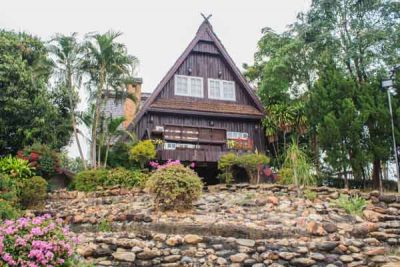
There are plenty of good houses on the market in Chiang Mai, along with cheap land – though only Thai nationals are permitted to own land here. However, many foreigners become proxy owners, using their wife, husband or a company to acquire land. It can be a risky option and authorities are becoming stricter in vetting the money trail when land is registered from a sale.
Foreigners wishing to invest in property and land in Chiang Mai will usually find outstanding value for money on land and property, particularly when compared with prices in their own countries. In addition to cost savings, Chiang Mai is rated as one of Thailand’s most pleasant and ‘foreigner-friendly’ cities to live. Its land and property prices are far cheaper than Bangkok and the touristy part of the south, making it attractive when buying land or houses in Chiang Mai.
These days, most foreigners who buy land do so in their spouse’s name. There is of course a risk of control (should you fall out with your partner or they die) and, generally, the law in Thailand will not support your claim to recover some value from the deal. If you set up a company with the intention of buying land through a corporate structure, Thai nationals will have to own 50 per cent of that company, and the operations, registered capital and staffing of the company are now investigated to determine its legitimacy.
For non-natives without a Thai spouse, long-term leasehold is a common means of acquiring land and a house in Chiang Mai. While the land remains in Thai ownership, you can negotiate a 30-year lease (renewable up to 90 years), enabling you to effectively own the house. Some use this method to equitably divide ownership of land and house between themselves and their spouse. Care should be taken to legally cover all eventualities when undertaking this method, since the sale of land can render the lease void, and compensation claims will inch their way through the courts without guaranteed success.
While the land beyond the ever-expanding city limits provides the most value for money, land within the city proper – particularly around the riverside, Night Market and Nimmenhaemin areas – has increased significantly in line with the city’s prospering economic growth. This land may be relatively expensive, but trends suggest that it will retain, if not increase, in value.
Many houses are for sale on agents books, others are simply advertised by a sign on site, so it’s worth driving around preferred neighbourhoods. It is quite confounding to see neglected houses that are overpriced yet been on the market for a long time. Others are perfectly good but suffer the stigma of being located in failed housing projects. Maintenance and upkeep is not something locals are terribly fond of. All the same, you can get some good value for money buying houses in Chiang Mai.
The cost of buying land in Chiang Mai varies according to supply and demand and the specific attributes of particular locations. Prices can range from approximately 30,000 Baht per Thai square wah (4 square metres) in the city centre, and will then decrease on a sliding scale to around 10,000 Baht in suburban areas, still within 20 minutes of the city centre. It’s important to consider whether the land will need costly landfill to prevent flooding, since undeveloped land is often former rice paddy.
When buying land in Chiang Mai, there are three different types of title deeds. Chanotes are the most accurate and reliable since they have been demarcated using GPS and include most of the municipal district (up to the first ring road). Nor Gor is another common deed, which is less accurate but gives the holder full entitlement to the property they are buying – eventually they will be upgraded. Then there is Nor Gor Saam (3) which is a pre-Nor Gor deed that has yet to be finalised. These are not very secure since the holder is only a claimant to the land and though he can pass it on, there is a risk that the government might not upgrade the land to full title deed. Most Thais are confident they can bribe the problem away, as is commonly done.
There are also various building restrictions that are loosely applied, but unless you’re planning a condo these don’t apply. Most of Chiang Mai has pretty lax zoning enforcements. Check first with a trusted lawyer to enquire at the land office if the land or property you are buying has any conditions or debts attached to it. There are also regular cases of fraud where land title deeds are forged or incorrectly issued from the land office, resulting in legal challenges that can be arduous in resolving. Sometimes the property agents overlook this important deal.
The Asian Financial Crisis of 1997 started in Thailand, caused by fiscal irresponsibility and speculation on an overcooked Bangkok property market. Later dubbed the ‘Tom Yum Goong’ crisis, it threw the country’s economy into a dramatic tailspin that looted its foreign reserves and saw the Baht’s value plummet 40 per cent in three months. Even many years later, abandoned shells of skyscrapers dot the skyline and some local observers say it’s only a matter of time before it all happens again!
A word of warning when buying property in Chiang Mai that includes land deeds: since foreigners cannot ever own land in Thailand directly, the law will not support you in the event of a dispute. Many foreigners have been taken for a ride after buying land and placing it in a Thai partner’s name. When they become estranged it’s not uncommon for the Thai party to assume complete ownership and expect to derive a windfall from the split. Ultimately, the courts are ineffectual in helping reach a fair resolution, resulting in lost control over ownership.

